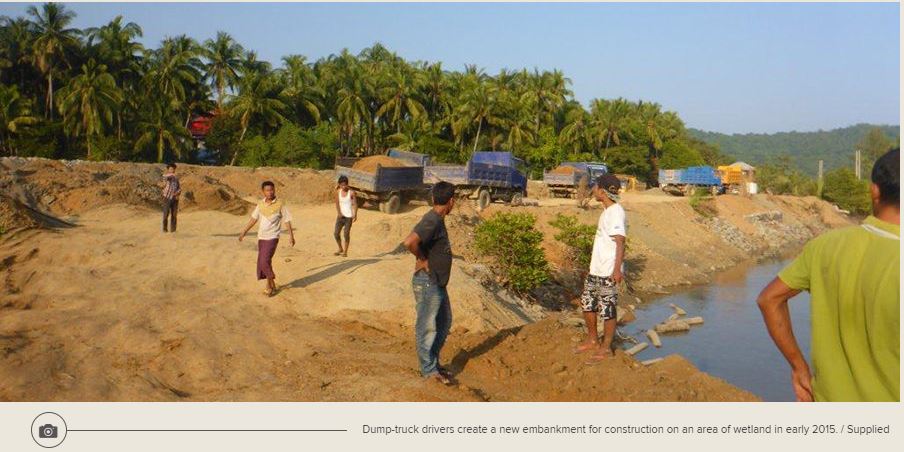
By MOE MYINT 28 March 2018
YANGON – Early this year, Rakhine State Chief Minister U Nyi Pu ordered a halt to an upscale hotel project on southern Rakhine State’s unique Ngapali Beach. Since 2015, at least 30 tons of beach sand have been used to fill a shallow inlet through wetland known locally as Lin Thar brook to accommodate the project, said Lin Thar village administrator U Myint Tun.
Rakhine State cabinet members have determined that the high-end project violated the Conservation of Water Resources and Rivers Law enacted under ex-military dictator Sen-Gen Than Shwe, as well as coastal directives issued by the Ministry of Hotels and Tourism. Despite this, the developer was granted land ownership documents by the Land Registration Department of Thandwe district, which is under the control of the General Administration Department.
The project is situated between the Golden Coconut Garden, which is owned by the Myanmar military, and the Silver Beach resort on the Lin Thar village seashore. An approximately 50-meter-wide inlet flows in a zig-zag through the village, and a large sandbank protrudes from the mouth of the river.
According to Lin Thar administrators, nearly 100 villagers complained to the Rakhine government three years ago after fishermen lost their docking areas, which had been lined with nipa palms and mangrove forests, when businessmen involved in the hotel project used dredging machines to pump beach sand from the foreshore.

“Once, fishing boats could dock there, but it’s gone now,” U Myint Tun said. “I can’t say exactly how many tons of beach sand they removed, but I am sure it’s a lot,” he said.
Last week, Rakhine State Planning and Finance Minister U Kyaw Aye Thein confirmed that the cabinet had ordered a halt to the project, but he could not provide detailed information such as the total land area of the project.
A hotelier from Ngapali told The Irrawaddy on condition of anonymity that the land was bought by U Soe Myint, a former shareholder in First Myanmar Investment (FMI) group. Ngapali residents know him as U Sein Gay, who served as a mayor of Pyin Oo Lwin in Mandalay division around 2001. He currently operates Hotel Pyin Oo Lwin, which is a part of the Soe and Associates hotel group. His status as a shareholder in FMI group remains unclear.
A senior staff member at Hotel Pyin Oo Lwin confirmed to The Irrawaddy over the phone on Wednesday that her boss bought an area of wetland in Ngapali but had no further information. U Soe Myint declined to comment via an employee on Wednesday.
The hotelier disclosed that U Soe Myint tried to resell the disputed land to some foreigners with the help of a US lawyer in order to start a profit-sharing project, but it was canceled. The investor had intended to put about USD40 million into the luxury beach resort.
Both the hotelier and Lin Thar village administrator U Tun Myint estimated that around 5 or 6 acres of mangrove lands had been covered by salty beach sand, and that around 5 acres remained unspoiled. A hotel owner estimated that U Soe Myint’s project had resulted in about 30 tons of beach sand being moved, and even labeled the act as “ecotourism crime”.
“The small river has been shrunk to nearly half of its former total acreage,” he said.

During a recent visit, The Irrawaddy independently verified that the developer had laid concrete blocks and filled the site in with white sand, which could clearly be seen from the air, surrounded by trees.
Breaching MOHT’s coastal directives is not unusual in Ngapali, where investors and residents routinely violate them for their personal interest. As a result of large-scale sand mining and the construction of huge retaining walls along the seashore for the purpose of keeping out high waves during the rainy season, once-pristine Ngapali Beach is now marked by a steep slope and foot-high sand terraces. For various reasons, Ngapali, once ranked No. 1 by travelers, was not among Trip Advisor’s top 25 beaches for 2018.
Early this month, Union Hotels and Tourism Minister U Ohn Maung, Chief Minister U Nyi Pu and several cabinet members held a meeting with hotelier associations in Ngapali. Some guesthouse owners strongly criticized the lack of law enforcement and continued illegal sand mining in Ngapali.
Just last weekend, two motorboats from Irrawaddy delta bearing the name Sai Shan Tun mined with heavy equipment right in front of the standing Buddha stupa in Gyeiktaw village and directly pumped the sand to a nearby compound, despite government officials’ insistence that sand mining is strictly prohibited on Ngapali Beach.
Rakhine Government Puts Brakes on Ngapali Beach Hotel Project
